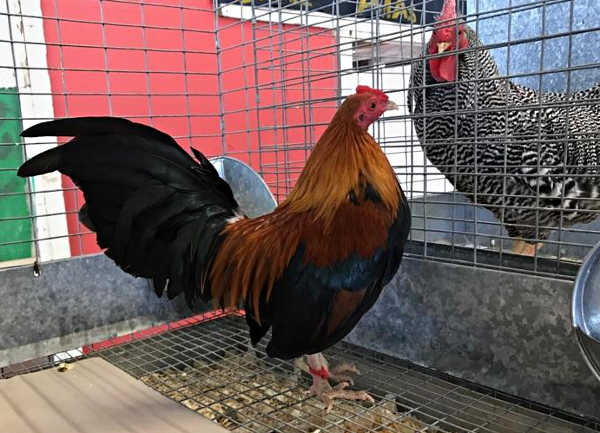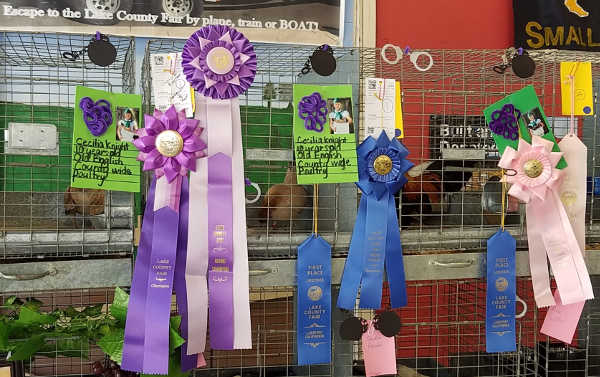
LAKEPORT, Calif. – Due to concerns about a virulent Newcastle disease outbreak in Southern California and a confirmed case in the Bay Area, the Lake County Fair’s Junior Livestock Committee has decided that it will cancel the poultry show at this year’s fair.
Fair Chief Executive Officer Courtny Conkle and Katy Evans, the committee’s secretary, told Lake County News that the decision was made out of an abundance of caution.
“I think it’s a shame that they’ve canceled it,” said Kelseyville resident Carrie Lauenroth, who has overseen the fair poultry show for the past 10 years.
The United States Department of Agriculture said Newcastle disease is a contagious and fatal viral disease affecting the respiratory, nervous and digestive systems of birds and poultry.
“The disease is so virulent that many birds and poultry die without showing any clinical signs,” the agency reported.
The California Department of Food and Agriculture reported that wild birds are not believed to play a major role in the spread of the disease, however, they can become infected or mechanically carry the virus. Overall, the heaviest impact is seen in poultry.
While deadly for poultry and birds, virulent Newcastle disease is not a food safety concern; no human cases of Newcastle disease have ever occurred from eating poultry products, the USDA said.
Officials said that only in rare instances have humans who work with poultry become infected – with mild symptoms such as conjunctivitis – as it’s easy to avoid through wearing the proper protective equipment.
The USDA reported that, from May 18, 2018, through June 7, 2019, it has confirmed 445 cases of virulent Newcastle disease in California, including 141 in San Bernardino County, 259 in Riverside County, 44 in Los Angeles County, one in Ventura County and one in Alameda County.
Two additional cases also have been confirmed elsewhere in the southwest, including one in Utah and one in Arizona.
New cases have continued to be confirmed up through June 4, when more backyard exhibition birds in Riverside County were confirmed to be infected, according to USDA reports.
In January, State Veterinarian Dr. Annette Jones sent a letter to poultry exhibition organizers and managers recommending that state poultry exhibitions that include birds from the infected counties be canceled.
The following month, she issued a quarantine for poultry for all of Los Angeles County, and portions of San Bernardino and Riverside counties in response to the outbreak.
California’s virulent Newcastle disease outbreak has led to the euthanization of about 1.2 million birds, with 1.1 million of those being commercial, according to CDFA spokesman Steve Lyle. He said there have been no more recent commercial detections.
Jones reported that the last virulent Newcastle disease outbreak in the United States occurred in 2002 and also impacted Southern California, leading to the death of 3.2 million birds with a response cost of more than $160 million.
Jones’ letter to exhibit managers said the only way to stop the spread of the virus and eradicate Newcastle disease is to euthanize not just infected birds but all birds within highly infected areas, as the disease primarily moves and spreads through birds that appear healthy.
On March 13, one chicken taken to a veterinary office in Redwood City by a backyard bird owner that lived in Alameda County was confirmed positive for Newcastle disease and euthanized, which resulted in an investigation, according to the USDA and CDFA. So far, the disease hasn’t been reported elsewhere in Northern California.
Jones issued field biosecurity guidelines on May 8 urging all state, county and city personnel to suspend all on-farm poultry area visits.
A May 21 letter from CDFA and USDA to residents of the quarantine areas addressed the practice of euthanizing poultry that are either infected or at high risk of becoming infected, which has led to controversy among bird breeders and enthusiasts.
“We are all in this together, trying to accomplish the very unpleasant mission of humanely euthanizing poultry either infected with VND or at high risk of becoming infected,” the letter said, going on to add, “The diagnostic tests that are currently available do not always show detection of infected birds. If a bird has recently been infected, it may be too soon for the virus to show up in these tests. Therefore, using testing to decide which animals to euthanize in areas that are already highly infected could cause this virus to continue to spread.”
In order to stop the outbreak’s spread, the United States Postal Service is not allowing shipments of live birds or hatching eggs into or out of zip codes 90000 to 93599.

Taking action
The state has urged poultry producers and exhibit managers to continue heightened biosecurity efforts through July 1, at which point CDFA will provide an updated risk evaluation.
However, with the need to make decisions for the fair months earlier than the anticipated July update, and with the Alameda case being only a few hours away – in Conkle’s words, “too close for comfort” – Conkle said they decided to take the safest approach and not hold the show, a decision made earlier this spring. Conkle informed the Fair Board about the decision at its April meeting.
A number of other fairs around the state – including the California Mid-State Fair, Del Norte County Fair, Santa Barbara County Fair and the Stanislaus County Fair – have made similar decisions to cancel their youth poultry shows due to concerns about the disease outbreak.
“I don’t know that this has ever happened at the Lake County Fair,” said Conkle, noting that they had gone back and forth on the decision for months.
“It’s just too risky,” she said, adding that the main priority is to keep the fair safe.
Evans, who also is community leaders for Anderson Marsh 4-H Club, said they had looked at a closed show and other options, but at the March meeting made the decision because families were going to be left up in the air.
It was too long of a wait to July 1, and rather than keeping everyone on edge, they decided to cancel the show, she said.
“If it’s got feathers, it’s not going anywhere,” Evans said.
Even for hobby birds, Evans said years of breeding are involved. “There’s a lot at stake.”
Evans said that, for a lot of children, poultry is their only show option.
Like Conkle, she didn’t know of a previous poultry show cancellation at the Lake County Fair.
Lauenroth said she was told earlier this year that the committee was thinking of canceling the show.
Then Conkle called her to tell her the disease was found in Redwood City, with the concern that it could be in Lake County in no time. At the committee’s meeting in March, the decision to cancel the show was made, Lauenroth said.
“I have really mixed emotions on it,” Lauenroth said, explaining that chickens and turkeys and other smaller animals are the show options for many children because they are less expensive, and provide an entry point into participating.
Her son got started in fair shows with turkeys, and her daughter started with show chickens before moving to market turkeys and then to pigs.
Lauenroth said her niece was going to have her first meat market chickens in this year’s fair before the cancellation. Her niece is now transitioning to cavies, or guinea pigs. Some other children are transitioning to rabbits.
She suggested the best way to stop the disease is through education about how the disease spreads, noting she sees a lot of people being given chickens for free.
Lauenroth said she is hoping that there will still be some kind of poultry-related events at the fair – such as an egg and spoon relay for children – to keep them involved and interested in 4-H and fair activities.
“Once you lose a kid you never get them back,” she said.
Email Elizabeth Larson at

 How to resolve AdBlock issue?
How to resolve AdBlock issue? 



